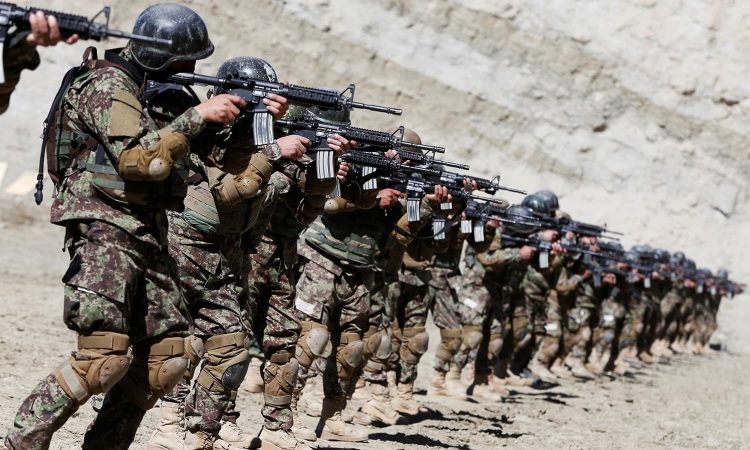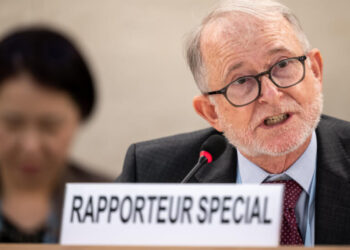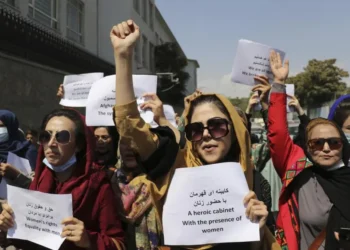Human Lives Human Rights: During the Taliban offensive between May-August 2021, more than 3,750 civilians were killed or maimed in Taliban attacks and retaliatory airstrikes by the former Afghan government, according to OHCHR and UNAMA. The Taliban, US armed forces and Afghan national security forces all perpetrated attacks that likely amount to war crimes and crimes against humanity.
On 15 August 2021 Taliban forces entered Kabul, effectively overthrowing the Afghan government. There are also reports that civilians in areas captured by the Taliban faced summary executions, looting and burning of homes and enforced disappearance.
According to the UN Office for the Coordination of Humanitarian Affairs, between 1 January and 31 July of 2021 over 546 000 Afghans were newly displaced, 80 % of whom are women and
children. Since August 15, vulnerable populations, including former government employees, journalists, human rights defenders, religious minorities, and women and girls, have been targeted and repressed by the Taliban.
OHCHR and UNAMA have reported reprisal killings of former Afghan security personnel, arbitrary
detention and arrests of officials who worked for previous Afghan government administrations, as well as harassment and intimidation of UN national staff in Afghanistan. According to
Human Rights Watch, Taliban officials have forcibly displaced residents in several provinces, including Shia Hazara and people associated with the former government, as a form of collective punishment.
Reports also indicate a pattern of grave human rights violations against women and girls as previously experienced under Taliban rule, including forced marriage as well as restrictions on freedom of movement, employment opportunities and access to education.
Attacks and bombings by non-state armed groups, such as the so-called Islamic State of Iraq and the Levant-Khorasan (ISIL-K), have also increased since the Taliban takeover. On 26 August ISIL-K coordinated a suicide attack outside Kabul airport as Afghans attempted to flee the country, killing at least 170 civilians and 13 United States (US) troops. ISIL-K also carried out a series of attacks in October targeting the Shia minority, particularly the Hazara, including bombings at Shia mosques in
Kunduz, Kabul and Kandahar that killed more than 90 civilians.
When the Taliban were overthrown in 2001 by a North Atlantic Treaty Organization coalition of military forces, they conducted a prolonged insurgency against the internationally recognized
Afghan government. During two decades of war, the Taliban perpetrated likely crimes against humanity and war crimes. Meanwhile, Afghan security forces, members of the US military and Central Intelligence Agency (CIA) may have also committed war crimes, including the torture of detainees and summary executions. From 2009-2019 UNAMA recorded more than 10,000 civilian casualties per year. After the start of intra-Afghan negotiations in September 2020, the Taliban escalated their military campaign against the Afghan government and civilian casualties increased by 50 percent.
Analysis
Despite assurances from the Taliban, the threat of further war crimes and crimes against humanity has dramatically escalated since their takeover. Vulnerable populations, including women and girls, minorities, journalists, civil servants, those affiliated with the former Afghan government, and anyone who previously worked for or with foreign governments, are at high risk of retaliatory attacks.
Religious institutions have been increasingly targeted by ISIL-K since August, heightening atrocity risks faced by minorities, particularly the Hazara. When the Taliban last ruled Afghanistan from 1996-2001, populations suffered widespread human rights abuses, with women and minorities facing systematic persecution. Since then, Afghan civilians have endured a seemingly endless cycle of war crimes and crimes against humanity.
All parties to the conflict must honor their obligations under international law and uphold their responsibility to protect the people of Afghanistan.
International Response
Since 2011 the UN Security Council (UNSC) has imposed an arms embargo and sanctions on individuals or entities who support the Taliban and its affiliates. Since May 2021 the UNSC has held
several special sessions and issued two Press Statements on the Taliban takeover. On 30 August the UNSC adopted Resolution 2593, calling for safe passage of those wishing to leave, unhindered humanitarian access and respect for human rights, particularly of women and girls.
On 24 August the UN Human Rights Council (HRC) adopted a resolution on Afghanistan during an emergency special session, but failed to establish a proposed investigative mechanism. On 7 October the HRC appointed a Special Rapporteur to monitor and report on the situation of human rights in Afghanistan.
On 5 March 2020 the Appeals Chamber of the International Criminal Court (ICC) authorized the Office of the Prosecutor (OTP) to investigate alleged atrocity crimes perpetrated in Afghanistan by all parties since 1 July 2002. Although the OTP had paused its investigations on 26 March 2020 following a request from the Afghan government to conduct investigations nationally, on 27 September 2021 Chief Prosecutor Karim Khan requested authorization to resume the investigation into the situation due to the Taliban’s takeover. Chief Prosecutor Khan also announced the decision to focus on crimes allegedly perpetrated by the Taliban and ISIL-K, and to de-prioritize other
aspects of the investigation, including likely war crimes and crimes against humanity committed by Afghan national security forces, US forces and the CIA.
Necessary Action
The Taliban and all international actors engaging with their representatives must ensure respect for international law, as well as the promotion and protection of human rights for all Afghans. Recognition of a new government in Afghanistan, as well as acceptance of the Taliban’s UN credentials must be contingent upon respect for human rights, severance of all terrorism ties and adherence to Afghanistan’s international treaty obligations. The Taliban must cooperate with and facilitate access for the UN Special Rapporteur and any other human rights monitoring mechanisms, as well as ensure the safety of all humanitarian workers and organizations.
The UN Security Council and Human Rights must take action to protect the human rights and humanitarian needs of the Afghan people, including the protection of UNAMA’s vital work. All governments, including regional governments, must continue to take steps to ensure the safe passage of civilians through Afghanistan who are at risk of being targeted by the Taliban, including the refugees.
The international community should continue to pursue international justice for war crimes committed in Afghanistan, regardless of the position, nationality or affiliation of the alleged perpetrator.

















